Republicans have recently come under fire for pursuing legal actions aimed at addressing overseas and military voting procedures in various states. These lawsuits, initiated by the Republican National Committee, raise concerns regarding potential voter fraud and the security of the electoral process. However, the lawsuits have sparked a backlash from critics who argue that these efforts could disenfranchise a significant group of voters and undermine the democratic principles of fair and accessible elections.
The crux of the issue revolves around the implementation of certain voting policies that specifically impact overseas and military voters. Republicans argue that stricter regulations are necessary to prevent potential fraud and ensure the integrity of the electoral system. They have targeted several states, including California and Nevada, where they claim that the current voting procedures do not provide adequate safeguards against fraud.
Critics, on the other hand, view these lawsuits as a veiled attempt to suppress voter turnout among certain demographics, particularly overseas and military voters who may lean towards the Democratic Party. They argue that imposing additional hurdles for these voters to cast their ballots could lead to voter disenfranchisement and undermine the fundamental right to participate in the democratic process.
Moreover, opponents of the lawsuits emphasize the importance of protecting the rights of overseas and military voters, many of whom are serving their country abroad and rely on absentee ballots to exercise their right to vote. They argue that any changes to the voting process should prioritize accessibility and inclusivity to ensure that all eligible voters, regardless of their location or circumstances, have the opportunity to participate in elections.
The legal battles over overseas and military voting rights highlight a broader debate about the balance between election security and voter access. While it is crucial to address concerns about potential fraud and uphold the integrity of the electoral process, it is equally important to safeguard the rights of all citizens to participate in elections without unnecessary barriers or discrimination.
As the lawsuits continue to unfold and draw scrutiny from various stakeholders, it remains imperative for policymakers to strike a balance that ensures both the security and accessibility of the voting process. Ultimately, the goal should be to strengthen democratic norms and protect the rights of all voters, including those who serve their country overseas or in the military. By engaging in constructive dialogue and finding common ground, policymakers can work towards a more inclusive and secure electoral system that upholds the principles of democracy for all.


























